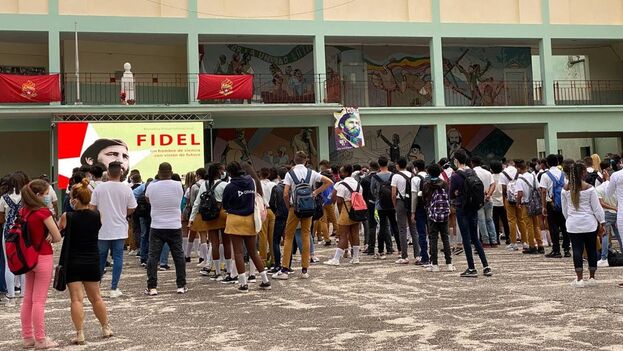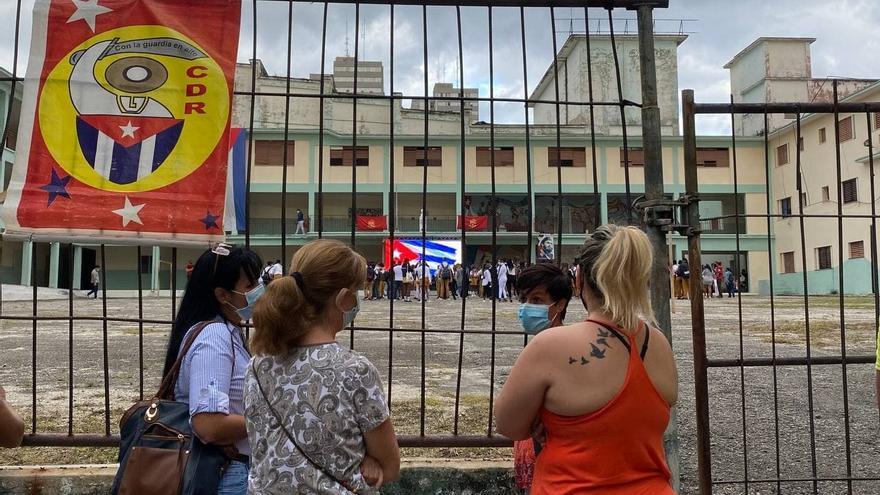
![]() 14ymedio, Luz Escobar, Havana, 8 November 2021 — For more than half an hour, the students of the José Luis Arruñada school, in Havana, waited standing in the courtyard for the activity to begin to mark the restart of the 2020-2021 school year. Already at the parents’ meeting, held last week, the teachers had informed everyone that the school had been selected to celebrate “the central act” in the capital and warned: “Television is going to come and everything.”
14ymedio, Luz Escobar, Havana, 8 November 2021 — For more than half an hour, the students of the José Luis Arruñada school, in Havana, waited standing in the courtyard for the activity to begin to mark the restart of the 2020-2021 school year. Already at the parents’ meeting, held last week, the teachers had informed everyone that the school had been selected to celebrate “the central act” in the capital and warned: “Television is going to come and everything.”
During the wait, songs by Silvio Rodríguez and Pablo Milanés were played over the loudspeakers, while the image of the Cuban flag alternated with that of Fidel Castro on a huge screen.
The setting was not the usual one. This time, the uniformity of the wardrobe was missing: many of the students had to attend this Monday in “street clothes” because the educational authorities have not been able to coordinate the making and sale of new uniforms in time with industry and commerce. During the long months of the pandemic, children have grown or gained weight and the one they were wearing before the order to pause classes and stay home no longer fits them.
The parents had to settle for watching the event from the gate. Due to the protection measures to avoid the contagion of covid-19, family members were prohibited from entering. The conversation of the group that gathered at the entrance revolved around the economic juggling that everyone has had to do to get clothes and shoes so that the children could attend the classrooms on this day. They also complained about the delay in starting the ceremony and the lack of distance between the children.

“I don’t know why to have them standing there for fun, all on top of each other. Nor do I understand what they are waiting for if all the children are already in place and have been ready for a long time. It is not correct for them to stand around waiting for so long with those backpacks full of books,” says one mother to another, who also complains for other reasons.
“For two weeks I sent some clothes that I do not wear to a friend who has a garage sale at her house on weekends. I earned 3,000 pesos from that and I sold a coat from a trip I made to Russia two years ago, before the pandemic. Thanks to that I was able to raise the 6,000 pesos I needed to buy my son’s tennis shoes, otherwise it would have been impossible because my [monthly] salary is 4,800.”
Another of the mothers comments, “Luckily mine is still the same size, she did not grow that much in this time and she still has a uniform and even her shoes fit well. The drama at home was getting something to prepare for breakfast and a snack. Do you know what my daughter had for breakfast? A banana. She always has a glass of milk for breakfast because she does not like to eat bread early and does not drink juice, but I have not been able to buy milk since September. There is no milk, I can’t find it at any price,” she laments.
A father who listened in silence, the only one among so many mothers, said that in his house, where there are two children, one 11 and one 5, they buy on the black market for breakfast and lunch.
“Before we could stretch the milk that they are still selling on the ration book for the smallest children, but now they are only giving half of the amount,” he complains. “We went from buying a kilogram a month to only half a kilogram and nobody knows how long it will be like that.”
The man points out that, in the absence of milk, during all this time his son, who is in the sixth grade, has had an ice cream waffle for breakfast that they sell on the corner from his house. “Now it is impossible to solve that way. When he leaves for school the cafeteria is closed and he has had to leave with only toast in his belly, and for a snack he takes an omelette, because there is nothing else. I know that this is going to be a headache every day.”
The conversation is interrupted when strident music plays that announces the beginning of the morning. Three girls solemnly walk and leave a bouquet of flowers on José Martí’s bust, the national anthem plays and everyone sings it. Then a teacher arrives who gives the reading of some words that served as gratitude “for the efforts of our scientists and doctors” that allowed the vaccination stage “that today encourages the reunion of teachers and students.”
She also lists several reasons that “motivate” the start of the course: “The 502nd anniversary of the founding of the town of San Cristóbal de La Habana, the 96th anniversary of the birth of our greatest pioneer, Fidel Castro Ruz, the 60th anniversary of the Union of Young Communists, the 61st anniversary of the José Martí Pioneers Organization, and the 60th anniversary of the Literacy Campaign.”
Then she welcomed everyone present and announced the presence of officials from the Communist Party of Cuba, the People’s Power, the Ministry of Education, the Workers Center of Cuba, the Union of Young Communists and “community factors.” Later, the parents learned from Tribuna de La Habana that the central act of the province had taken place at a school in La Lisa.
At that moment, a young man with black hair of medium height, with a press credential hanging around his neck, approaches the fence with his camera to take a picture. Noticing that the gate is open, he enters to take the portraits more closely.
A lady among those who until that moment were chatting animatedly jumps up and says: “And that one who came in now, who is he? Is he a real journalist? He looks like the stupid one who wants to march on the 15th,” says the woman with a high tone of voice and a noticeable alteration. “I’m not going to take an eye off him because this is like him carrying a bomb, but the way he wants, no; against the revolution, no. I complain and criticize everything, there is no milk for the children, you have to line up for five or six hours but the revolution is not touched.” Another lady who was looking her in the face told her: “The revolution has given us everything.”
Five minutes later, the young reporter leaves through the same door through which he entered and leaves, but not without the angry lady first asking what medium he works for, to which he replies: “I am a journalist for Juventud Rebelde,” a state newspaper.
Some mothers were left commenting on the angry reaction of the woman and one of them said: “She is Raúl Castro’s niece, I know her, and her nerves are not well.”
The rain arrives and almost interrupts the act but it is only a few drops. Even so, the teachers rush the end and send the children to the classrooms. The parents gradually withdraw from the gate, but first a woman’s voice is heard saying: “Now the other battle begins, figuring out what to invent for lunch, we live on a nerve, it is an endless fight and it is not against the enemy, it is against ourselves.”
Hours later, when they got home, the high school students would tell their families what happened indoors. The first thing, they received a harangue from the Civic Education teacher against the day of protests on July 11: “I did not come to brainwash you but you cannot be carried away by bad influences, none of those who went out to the on the street that day have a job, they are all puppets of the empire, ungrateful ones. The country does not betray itself.”
____________
COLLABORATE WITH OUR WORK: The 14ymedio team is committed to practicing serious journalism that reflects Cuba’s reality in all its depth. Thank you for joining us on this long journey. We invite you to continue supporting us by becoming a member of 14ymedio now. Together we can continue transforming journalism in Cuba.
